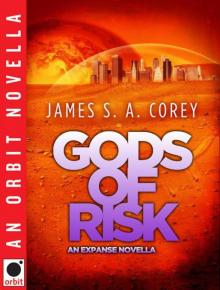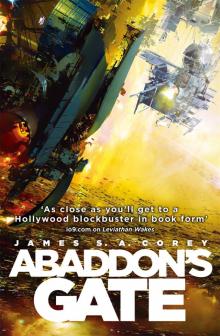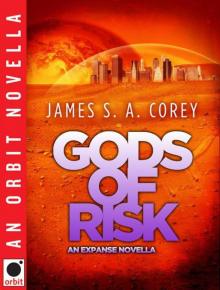- Home
- James S. A. Corey
Strange Dogs Page 3
Strange Dogs Read online
Page 3
“You’ve probably noticed,” Instructor Hannu, her teacher, said, “that the orbital platforms have been activated.”
The schoolroom was the old cafeteria from the first landing. Ten meters by eight, with a vaulted ceiling and reinforcements that let it double as a storm shelter, or would have if there were ever any storms bad enough to shelter from. The inner layer of environmental sealant had started to whiten and flake with age, but the early fears about quarantining themselves from Laconia’s ecosphere had gone by the wayside, so no one was in a hurry to repair it. There were no windows, the light entirely from ceramic fixtures set into the walls.
“We’ve been asked to keep an eye out for anything that changes down here,” he went on, “and report it back to the military.”
Which, Cara thought, was stupid. Everything changed on Laconia all the time. Telling the soldiers whenever a new plant showed up would be a full-time job. Was a full-time job. Was what all of their parents did, or were supposed to do, anyway. She wondered if the windowless room was like being on a spaceship. Months or years without ever once going outside or hearing the rain tapping into puddles or being able to get away from Xan and her parents. Never being alone. Never feeling the sunlight on her face. Nothing changing. Nothing new. It sounded awful.
And then circle meeting was over, and the kids scattered around the room to find their tasks for the morning work period. Cara helped Jason Lu with his phonetic-sounds lesson, because she was older and had already mastered it. Then she spent some time on complex multiplication. And then it was recess, and they all piled out to the meadow and the sunlight. Xan and two of the other younger boys ran across the road to skip rocks across the water-treatment reservoir even though they weren’t supposed to. Since his best friend, Santiago, went to school in the military’s program, Xan had to make do with first-wave children for playmates. So did Cara, but it wasn’t as much of a burden for her. She didn’t have any friends among the soldiers anyway.
That would change when they set up the lower university and everyone went to the same school, first wave and soldiers both. But that wouldn’t be for another two years. There was plenty of time for things to happen between now and then.
Mari Tennanbaum and Teresa Ekandjo came and sat with her, and before long, they’d arranged a zombie-tag game with the other older children. The call for second work period seemed to come too soon, but that was the way time worked. Too fast when you weren’t paying attention, and then slow as mud when you watched it. Xan wanted her to teach him phonetic sounds, more because she’d helped Jason with it than because he cared about the lesson, but she did it anyway. When she was done, she did some research of her own.
The classroom had access to the observational data that the survey team had collected since they’d arrived on Laconia. Sunbirds were a common enough species that there might be something there—what they ate, how they matured, when they stopped needing to be cared for—that would help her. Because as soon as school was over, Xan headed out to play with Santiago in the town’s center. She was free to get her bicycle, the one her father had printed for her at the beginning of summer, and start back to the pond and the babies.
The buildings in the town were of two different types. The old ones, the ones like her house, lumpy and round, built from the soil of Laconia and constrained by printed polymer sheaths, marked the original township. The other kind, solidly efficient metal and formed concrete, came later with the soldiers. The roads were new too, and still being built. She and all the other kids loved riding on the smooth, hard surface, feeling the bumps and uncertainty of the land vanish into a steady low hum that traveled up from the wheels through the handlebars and into her bones. They weren’t supposed to ride on the roads because the soldiers sometimes had transports and cars come through, but everyone did it anyway.
The sunlight pressed down, warm against her skin. The air had the soft, musty smell it got when rain was coming, the smell her mother called “moldy coffee grounds.” A swarm of smoke gnats rose up, swirling into the sky above her in their weird angular patterns, like writing in an alphabet that no one knew. She almost stopped to watch. The road ended at a barracks and construction yard, soldiers in their crisp blue uniforms watching her as she passed. When she waved, one of them waved back. And then she was on the rough trail again and had to keep both hands on the bars.
The effort of riding and the warmth of the afternoon brought her to a kind of trance, comfortable and mindless. In the moment, her body and the world felt like they were all the same thing. As she got near home, she tried to bring her focus back. There hadn’t been a lot of study done on sunbird life cycles in particular, but she’d found some notes from one of the early surveys. They said sunbirds ate a lot of things, but they seemed to like the little gray encrustations on water roots the best. She thought that meant Momma bird would have been diving deep into the pond to crack the little gray things free, and then the babies would gobble them as they came up. So she had to find a way to do the same thing. For a few more weeks at least. Until the babies were old enough to leave and make their own nests.
At home, the doors were open, letting the cool air into the house. She pulled the bicycle up beside the door. Her parents’ voices came from inside, raised the way they did when they were having a conversation from different rooms. Her mother’s words sounded jagged and stretched, like a wire on the edge of breaking. Cara paused to eavesdrop.
“We’re bearing the risks. As long as we’re here, anything they do can affect us. They don’t know what they could wake up.”
“I know,” her father said. “Look, I’m not saying you’re wrong. But we’re not in a position to say what those risks are. And…what are the options?”
She knew the rhythm of her parents, how they talked when they knew she and Xan were listening, and how it changed when they thought they were alone. This was alone-grown-up talk.
“I’m not arguing for that,” her mother said, and Cara wondered what “that” was. “But look at Ilus.”
“Ilus was uncontrolled, though. Admiral Duarte seems pretty certain they can at least influence how it behaves here.”
“How did they even get a live sample?” Her mother’s voice had gone peevish and frustrated. “Why would you want that?”
“You know this better than I do, honey. The protomolecule was a bridge builder, but it also has an interface aspect. And being able to talk to other artifacts is…” His words faded as, somewhere inside, he walked back to her mother.
Cara looked at the shed. She was pretty sure there was a tree-core sampler in there she could use to scrape the roots, but it was heavy. It probably made more sense to just roll her sleeves up and use her fingers. Plus which, she didn’t want to tear the roots.
She walked out toward the pond, thinking about her schoolwork. The phonetics lesson. Part of the background had been about how babies learn the phonemes by listening to their parents even before there are any words involved. The way different places use sound—the difference between a particular diphthong on Ceres and the same one in the North American Shared Interest Zone or Korea or on Titan or Medina Station—was something babies mastered even before they knew that they knew it.
She’d read something once about a man back on Earth who’d tried to figure out how to speak with octopi by raising his baby children with octopi, hoping that the human children would grow up bilingual in octopus and English. It had sounded crazy at the time, but who knew? The way the phoneme thing worked, maybe it made sense after all. Only she was pretty sure no one spoke octopus, so it probably hadn’t ended well…
She walked down the path, her steps following the little scrapes that the cart’s wheels had made. The pond water was going to be cold. She could already imagine how it was going to feel pushing her arm down into it. She wondered if the babies would still be in the nest. They might be old enough to get themselves down and into the water, and she couldn’t decide if that would be a good thing or a bad one.
; The smell of coming weather was getting thicker, but the only clouds were light, scudding veils over the sun, not much more than a lighter shade of blue. The breeze was hardly enough to stir the fronds of the trees; they made light tapping sounds when they touched, like dry raindrops. She wondered if anyone had ever studied the little gray things on the water roots to see what they were. Probably they hadn’t. Laconia had too many things on it, and there were only so many people there. It would be lifetimes before everything on the planet got discovered and understood. If that ever even happened. She’d had a history-of-science lesson the year before that traced how long it had taken people back on Earth to understand the ecosphere there, and there had been billions of people on Earth for thousands of years. Laconia had a few thousand people for less than a decade.
At the pond, the babies were on the water, splashing pale leathery wings and piping to each other. That was good. They were independent enough to look after themselves that much anyway. With the drone broken, she’d still have to carry them up to the nest. She didn’t like thinking about the drone, though.
“Okay, little ones,” she said. “Let’s see if I can get you some food, okay?”
She knelt at the water’s edge, the wet of the mud seeping through the knees of her pants. Deep in the water, she could just make out the pale roots. They looked deeper in than she’d remembered. She was going to wind up soaking her shirt, but she started rolling up her sleeves anyway.
Momma bird hissed.
Cara fell back, scrambling on feet and elbows, as Momma bird swam out of the scrub at the pond’s edge. The bird bared her greenish teeth. The tiny wrinkled face deformed in rage as she rushed forward, wings spread. The babies on the pond’s surface gathered behind her, clicking in distress. Cara stared, and Momma bird coughed, spat, and turned away. For a moment, Cara tried to make this into some other bird that had happened upon the orphans and taken over the care of them.
But things were wrong. The bird’s skin had the same waxy, dead look it had gotten on her counter. The black eyes didn’t quite focus the way a normal bird would. There were sunbirds all across the town. Cara had seen dozens, and none of them had the awkward movements this one did. None of them had the weird stillness between its movements or the hesitation like every muscle had to be reminded how to work. Cara pulled herself up the bank, dragging her heels across the blue clover. Momma bird ignored her, paddled to the center of the pond—paused, still as statue—and dove down. The babies circled, excited, until she bobbed back up. All their little mouths struck at the water, spat out whatever they didn’t filter out as food, and then struck again.
Cara’s throat felt thick. Her breath came in snatches and gasps, like someone had turned off the planet’s air supply, and her heart felt like something that had blundered into her rib cage by accident and was frantic for a way back out.
“Really?” she asked.
Nothing answered. She pulled her legs up under her, not realizing until she’d done it that she was taking what her teacher called prayer position. She tried to be still, as if moving might pop the moment like a soap bubble. Momma bird dove again, reemerged. The babies fed, as calm and pleased as if nothing had ever gone wrong. Momma bird went motionless, then moved again.
Cara’s shock began to fade, her heart to resume its usual beat, and a slow, wide grin pulled at her lips. She wrapped her arms around herself in a hug and watched silently as the mother who had been dead now protected and fed and stayed with her children again. Some deep, animal relief turned her bones to water and left her empty of everything but gratitude and wonder.
Something shifted in the darkness under the trees. The dogs stepped into the light, walking toward her with slow, careful steps. The bulbous eyes apologetic.
“Was this you?” Cara breathed. “Did you do this?”
The dogs didn’t answer. They only folded their complex legs and rested for a moment, looking toward Cara. She leaned over, stretched out a hand, and pet the closest one on the top of its head, where the ears would have been if it had been the kind of dog they had on Earth. Its skin was hot to the touch, soft with hard underneath, like velvet laid over steel. It made a gentle humming sound, and then all of them rose up together and turned back toward the trees. Cara stood up and walked after them, not sure what she wanted except that there was a sudden urgency in her heart. They couldn’t leave. Not yet.
“Wait,” she said. And the dogs stopped. They waited. “Can you…can you help me?”
They turned toward her again, their movements eerily synchronized. In the distance, something trilled and buzzed and trilled again.
“You fixed Momma bird,” she said, nodding toward the pond. “Can you fix other things too?”
The dogs didn’t move, but they didn’t turn away either. Cara held up a finger in a don’t-go-away gesture, and moved off to the bushes. The sampling drone was just where she’d left it. Something small had scattered the shattered bits a little, but they were all still there, as far as she could tell. She lifted up the broken machine, its limp, deactivated limbs clacking against each other. The shards she plucked up into her palm.
The dogs watched, motionless. Their constant embarrassed expression now seemed to offer some sympathy, as if feeling her shame at having broken the drone. One of the dogs came forward, and she thought it was the lead from before, though she couldn’t be sure. She knelt and held out the drone. She expected the eerie ki-ka-ko noise again, but the dog only opened its mouth a little. What she’d taken for teeth, she saw, were really just little nubs, like the gripping surface on a wheel made for off-road travel. It had no tongue. There was no throat at the back of its mouth. It made her think of the dinosaur puppet Xan used to love. It leaned forward, taking the drone in its jaws. The little machine hung limp.
A second dog stepped forward, tapping Cara’s hand with one wide paw. Cara opened her shard-filled hand. The dog leaned forward, wrapping its mouth around her palm. Something in the touch tingled like a mild electrical shock or the first contact of a caustic chemical. The dog’s mouth rippled against her skin, sweeping the shards away. She kept her hand flat until all the bits and pieces were gone and the dog leaned back. Her hand was clean apart from a brief scent of disinfectant, gone almost before she noticed it.
“Thank you,” she said as the dog stepped carefully into the darkness under the trees. The one with the drone in its grip turned back to look at her, as if it was embarrassed by her gratitude but felt obligated to acknowledge it. Then they were gone. She listened to the receding footsteps. They went silent more quickly than she’d expected.
She sat quietly, arms wrapped around her legs, and watched the weird miracle of the dead-but-not-dead sunbird until she felt like she’d given the moment all of the honor and respect it deserved.
Like someone rising from a pew, she stood, peace in her heart, and headed back home. As she walked, she imagined telling her parents about the dogs, about Momma bird. But that would mean telling them about the drone too. After it was fixed, she’d tell them. And anyway, it was still too sweet having it just for herself.
* * *
“I don’t know,” her mother said. “I don’t feel comfortable with it.”
Xan’s eyes got large. His mouth gaped like she’d just said the worst, most unexpected thing he’d ever heard. “Mom!”
It was Sunday, and the walk into town for church was warm, the air thick and sticky. A soft midnight rain had left the track muddy and slick, so Cara kept to the edge where moss and clover made a kind of carpet. The tiny green-black leaves made wet sounds under her feet, but didn’t soak her shoes.
“You have responsibilities at home,” her mother said, and Xan lifted his hands in exasperation and disbelief, like he was a half-sized copy of their father. Cara had seen the same gesture a thousand times.
“I already told Santiago I’d help him,” Xan said. “He’s expecting me.”
“Have you finished all your chores?”
“Yes,” Xan said. Cara knew i
t wasn’t true. Her mother did too. That was what made the conversation so interesting.
“Fine,” she said. “But be home before dark.”
Xan nodded. More to himself, Cara thought, than to their mother. A little victory of persistence over truth. After services, Xan could go off and play with his friends instead of being home the way he was supposed to. Probably she should have been angry at how unfair it was that her brother got to bend the rules and she didn’t, but she liked it better when the house and the forest were hers. Maybe her parents did too. It wasn’t really such a bad outcome if everyone was tacitly happy with it.
Cara’s father walked a dozen meters ahead with Jan Poole, the agricultural specialist. Jan’s house was on the way to town, and the older man joined them for the walk in to church each week. Or anyway, he did now that they went in for services.
Before the soldiers came, Cara remembered church being a much more optional thing. There had been months when Sunday morning hadn’t meant anything more strenuous than sleeping in and making breakfast for all of them to eat in their pajamas. Cara still wasn’t sure why the arrival of the soldiers and their ships had changed that. It wasn’t as though the soldiers made people come. Most of the men and women who’d come down from the ships to live on the planet didn’t come to church, and those that did weren’t any different from the science teams. When she’d asked, her mother had made an argument about needing to be part of the community that hadn’t made any sense. It all came down to: this was the way they did things now. And so they did them. Cara didn’t like it but didn’t hate it either, and the walk could be nice enough. She already knew—the same way she knew she’d get her period or that she’d move into her own house—that someday she’d push back against the weekly routine. But someday wasn’t yet.

 Leviathan Wakes
Leviathan Wakes Gods of Risk
Gods of Risk Babylon's Ashes
Babylon's Ashes Expanse 03 - Abaddon’s Gate
Expanse 03 - Abaddon’s Gate Tiamat's Wrath
Tiamat's Wrath Persepolis Rising
Persepolis Rising The Butcher of Anderson Station
The Butcher of Anderson Station The Churn
The Churn Expanse 05 - Nemesis Games
Expanse 05 - Nemesis Games Strange Dogs
Strange Dogs Honor Among Thieves: Star Wars
Honor Among Thieves: Star Wars Cibola Burn
Cibola Burn Caliban's War
Caliban's War The Vital Abyss
The Vital Abyss Auberon
Auberon Persepolis Rising (The Expanse)
Persepolis Rising (The Expanse) Caliban's War: Book Two of the Expanse series
Caliban's War: Book Two of the Expanse series Leviathan Wakes: Book One of The Expanse
Leviathan Wakes: Book One of The Expanse Cibola Burn (Expanse)
Cibola Burn (Expanse) Strange Dogs (Expanse)
Strange Dogs (Expanse) The Vital Abyss: An Expanse Novella (The Expanse)
The Vital Abyss: An Expanse Novella (The Expanse) Leviathan Wakes e-1
Leviathan Wakes e-1 Abaddon's Gate e-3
Abaddon's Gate e-3 Caliban;s war e-2
Caliban;s war e-2 Gods of Risk: An Expanse Novella
Gods of Risk: An Expanse Novella Honor Among Thieves: Star Wars (Empire and Rebellion)
Honor Among Thieves: Star Wars (Empire and Rebellion)